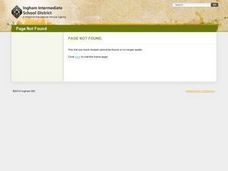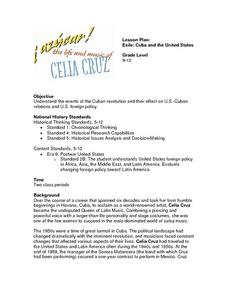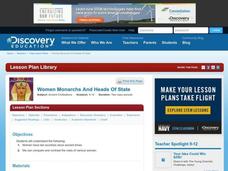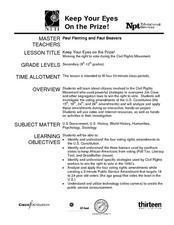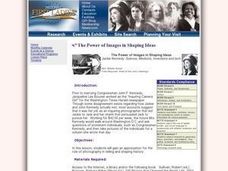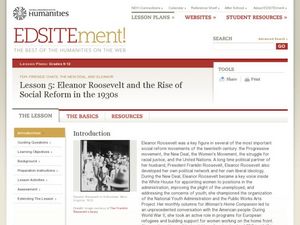PBS
Master of the Airwaves: How FDR Used Radio to Ease the Public’s Fears
The political and economic climate during the 1930's was uncertain and tumultuous. But Americans' minds and hearts were eased with the reassuring words of their president, Franklin D. Roosevelt, and addresses over the radio. High...
Syracuse University
Ancient World Writing System
Most twenty-first century pupils don't know how to interpret cuneiform. Examining images of cuneiform and papyrus writing and using a chart and Venn diagram, young historians extrapolate what life may have been like for people who lived...
Curated OER
Arkansas Civil War Bandits and Outlaws
Young historians study civilian Arkansas during the Civil War. They look at the many challenges they faced to keep their homes in order while the men were at war. Learners hear stories of bands of outlaws who ravaged the state during...
PBS
Using Primary Sources: Wide Open Town
A picture speaks a thousand words, no matter how old! Scholars use political cartoons from the era of Prohibition and the Temperance Movement to analyze what, a primary document (in this case, a bootlegger's notebook) is telling them...
US House of Representatives
Keeping the Faith: African Americans Return to Congress, 1929–1970
The third lesson in a unit that traces the history of African Americans serving in the US Congress examines the period from 1929 through 1970. After reading a contextual essay that details the few African Americans elected to Congress...
PBS
The Sixties: Dylan Plugs in and Sells Out
Before Woodstock, there was Newport. Get plugged in to the social changes of the 1960s with a lesson that looks at Bob Dylan's performance at the 1965 Newport Folk Festival as a symbol of the radical changes that marked the era.
Curated OER
Writing A Foreign Policy
Students write a modified "foreign policy" between their own high school and a rival school in the conference. They describe the significance of a foreign policy from the World War II era.
Facing History and Ourselves
How Do Others Define Your Identity?
Sixth graders examine the relationship between the individual and society. In this World History lesson, learners read a book that discusses labels put on individuals. Students create a story board in relation to the book.
Curated OER
Unit on Gandhi and Ahimsa
Students explore the history of Gandhi and his viewpoint and example of nonviolence. In this World History instructional activity, students complete numerous research assignments and activities over the course of nine lessons to expand...
Delegation of the European Union to the United States
The Founding and Development of the European Union
How did Europe transition from a period of conflict to a period of sustained peace? As class members continue their study of the history and development of the European Union, groups examine the events in six time periods, from the EU's...
Curated OER
Role Playing in North America: Mid 1600s-Mid 1700s
Eighth graders apply their knowledge of North American history from the mid 1600's through the mid 1700's to a role-playing scenario. In small groups they plan, write, and perform a dramatic skit of a group that was affected by events in...
Curated OER
Exile: Cuba and the United States
Students gain an understanding of U.S./Cuban Relations. In this world history lesson plan, students examine the events of the Cuban revolution and their effect on U.S.-Cuban relations and U.S. foreign policy.
Curated OER
Views of 9/11
Fifth graders examine through research ways people around the world viewed events of September 11, 2001, analyze how United States foreign policies have caused conflict with other regions and countries, research and read first person...
Curated OER
Women Monarchs And Heads Of State
Students explore the rule of women throughout history. In this world history lesson, students participate in a panel discussion which requires them to share the strengths and weaknesses of selected women rulers.
Curated OER
Keep Your Eye On the Prize
High schoolers learn about citizens who were actively involved in the civil rights movement, and the strategies they used to overcome the Jim Crow laws that were so prevalent in the 1960s. They investigate the voting amendments of the US...
Center for History Education
Women's Rights in the American Century
Today, many young people find it hard to understand why it took over 150 years for women in the United States to get the right to vote—why there was even a need for the suffrage movement. As they read a series of primary source...
National First Ladies' Library
The Power of Images in Shaping Ideas
Learners examine the role of photography in recording and sharing history. They view online photos that Life magazine has identified as changing the world, then conduct research on one of the photos. Students create and present an oral...
Curated OER
Reconstruction of Iraq: A Lesson of Historical Precedents
Students view a video clip about the reconstruction efforts in Iraq. They work together to compare and contrast the reconstruction plans after the Spanish-American War and World War II. They compare those results to the situation in Iraq.
Shakespeare Uncovered
All the Globe’s a Stage: Shakespeare’s Theatre
“All the world’s a stage,” exclaims Jaques in As You Like It, but it is the structure of the Globe stage and how that structure influenced Shakespeare’s plays that is the focus of an on-line research project. Class members visit a series...
Curated OER
Introduction to the Reformation
Ninth graders investigate the Protestant Reformation. In this global history lesson, 9th graders examine the provided primary sources that enable students to create posters and presentations that reveal how Catholicism, Lutheranism,...
National Endowment for the Humanities
Eleanor Roosevelt and the Rise of Social Reform in the 1930's
Eleventh graders explore the various roles that Eleanor Roosevelt took on. In this US History lesson, 11th graders analyze the views that Eleanor Roosevelt held as an advocate for social justice. Learners evaluate her contributions to...
US House of Representatives
Black Americans in Congress Speak Their Mind
To conclude their study of Black Americans in Congress, groups select a statement made by one of the Members, examine the Member's profile on the provided link, and create a display that includes state represented, years of service, an...
Curated OER
Letters from the Japanese American Internment
Students explore the concept of Japanese internment. In this Japanese internment lesson plan, students examine primary sources that enable them to discover what internment camp life was like and its implications, Students write their own...
Curated OER
Christopher Columbus
Students read about the good and bad aspects of Christopher Columbus in Jean Fritz's book, "Where do you think you're going, Christopher Columbus?" They conduct and analyze a survey about common myths and create a pop-up book.












